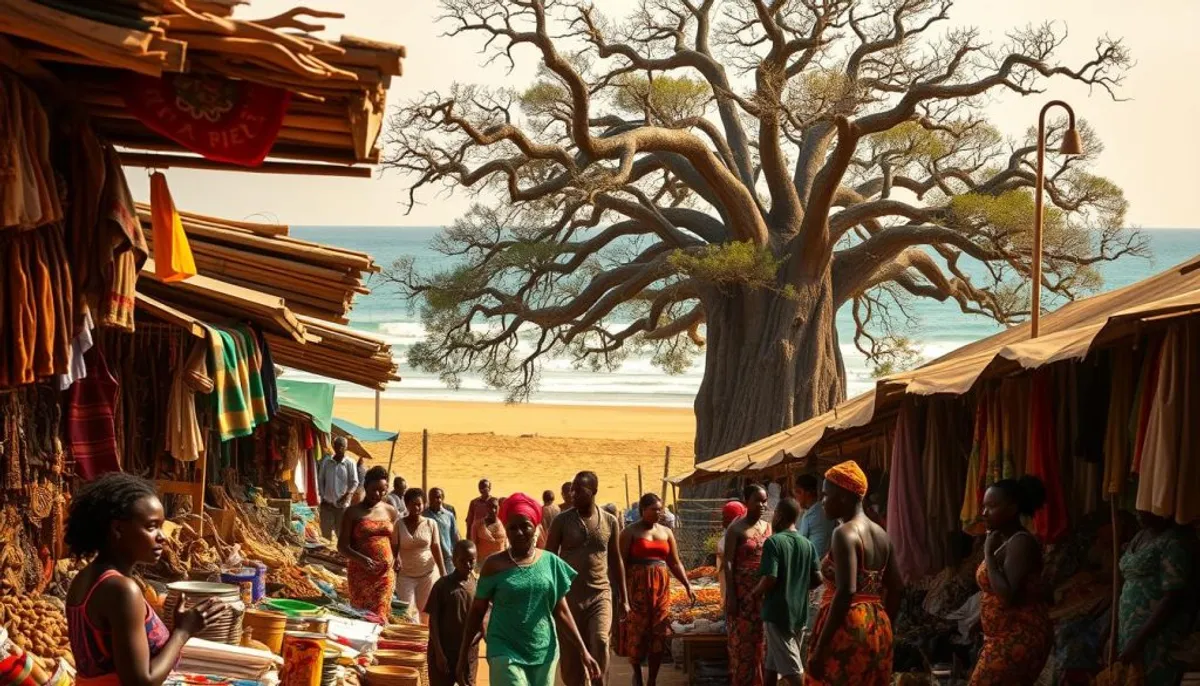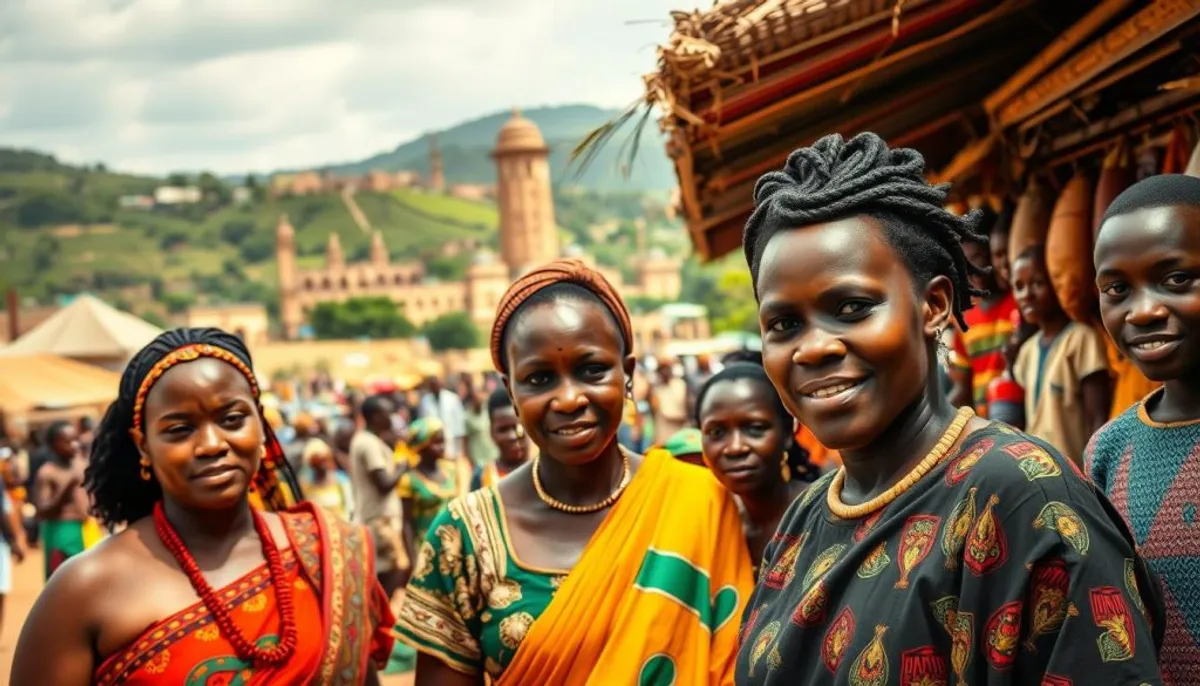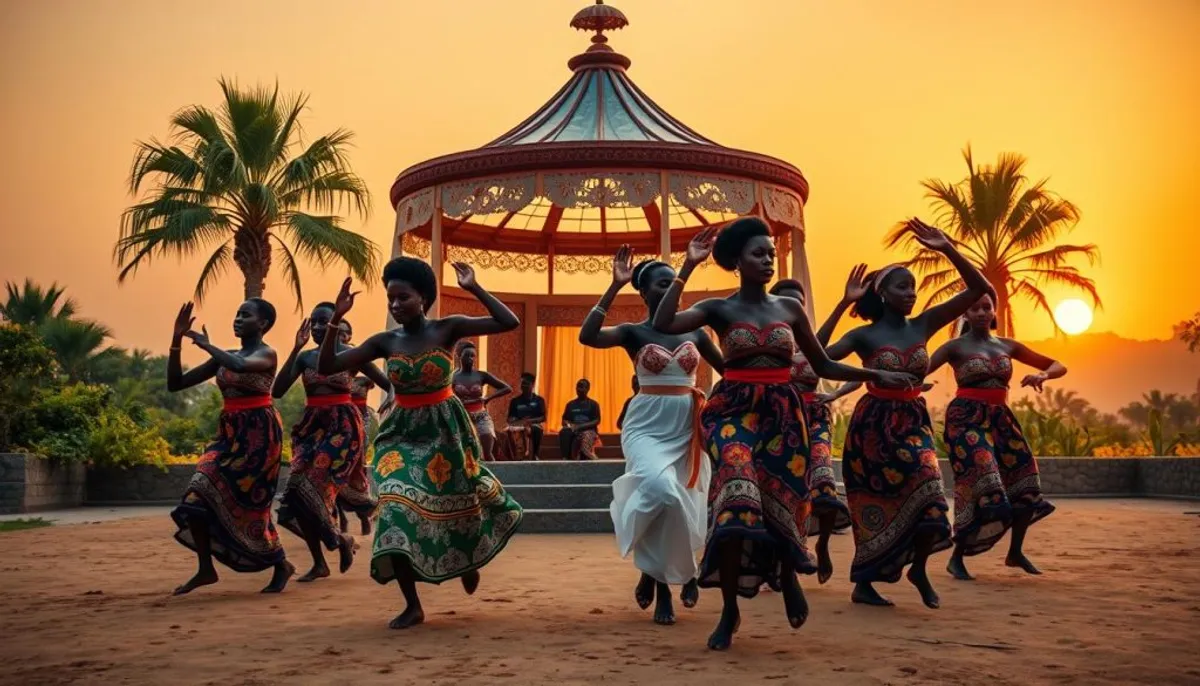The culture of Côte d’Ivoire is a true mosaic of traditions, languages, and artistic expressions. Located in West Africa, this country is home to remarkable ethnic diversity, with around 60 ethnic groups coexisting in harmony. This richness is manifested in all areas of Ivorian life, from cultural heritage to religious practices.

The Manding language dominates, spoken by 70% of the population. The Mandé, Krou, Akan, and other Wans peoples enrich this linguistic and cultural diversity. Religious beliefs also reflect this diversity, with Islam, Christianity, and animism representing 50%, 39.8%, and 2.2% of the population, respectively.
The Ivorian cultural heritage is expressed through numerous festivities, such as the yam festival, celebrated at various times depending on the regions. The sculptures of the Baoulé, Dan, and Senoufo are globally recognized for their beauty and cultural significance. Music, whether traditional or modern, like Alpha Blondy's reggae, plays a central role in Ivorian cultural expression.
The Ivorian ethnic and linguistic diversity
Côte d’Ivoire stands out for its cultural and linguistic wealth. With more than 60 ethnic groups, the country offers a varied and fascinating human landscape. This diversity is reflected in the Ivorian customs, creating a unique cultural mosaic in West Africa.

The four major ethnic groups
The Ivorian population is divided into four major ethnic groups:
- The Mandé: including the Malinké, Bambara, and Dioula
- The Krou: including the Bété, Guéré, and Dida
- The Gour: grouping the Sénoufo and Lobi
- The Akan: with the Baoulé, Agni, and Attié
Each group contributes its unique touch to Ivorian customs, including the Creole dance, enriching the cultural heritage of the country.
French and traditional languages
French is the official language of Côte d’Ivoire, used in administration and education. However, the country has more than 70 national languages, reflecting the diversity of Côte d’Ivoire's ethnic groups. Among the most spoken are Dioula, Baoulé, and Sénoufo.
The richness of Ivorian multilingualism
Multilingualism is a fundamental characteristic of Ivorian society. It is not uncommon to meet Ivorians speaking three languages or more. This linguistic diversity contributes to the richness of cultural exchanges and strengthens social cohesion among the different Côte d’Ivoire's ethnic groups.
| Ethnic Group | Percentage of the Population | Main Languages |
|---|---|---|
| Akan | 28.8% | Baoulé, Agni, Attié |
| Mandé | 26.5% | Malinké, Dioula |
| Gour | 17.6% | Sénoufo, Lobi |
| Krou | 12.2% | Bété, Guéré |
Traditions and religious beliefs
Côte d’Ivoire is distinguished by a rich and varied religious landscape. This landscape reflects the complexity of Ivorian traditions. Islam and Christianity coexist with ancestral beliefs, forming a unique blend of spirituality.
Islam and Christianity in Côte d’Ivoire
Islam and Christianity dominate the Ivorian religious landscape. Islam represents 50% of the population, while Christianity accounts for 39.8% of adherents. These monotheistic religions have profoundly influenced Ivorian society. They adapt to local cultural realities.
Ancestral animist practices
Despite the predominance of monotheistic religions, 2.2% of Ivorians still practice animism. These ancestral beliefs persist and intertwine with Islam and Christianity. They create a unique religious syncretism. Local deities and ancestral spirits play an important role in Ivorian folklore.
Traditional ceremonies and rituals
Traditional ceremonies and rituals are essential to Ivorian traditions. The Poro, practiced by the Sénoufo, is an emblematic example of these initiation rites. These ancestral practices perpetuate the transmission of cultural and spiritual values. They strengthen the bond between generations and preserve Ivorian identity.
This unique spiritual richness testifies to the diversity and tolerance of Ivorian society. The Ivorian traditions continue to shape the cultural identity of the country. They adapt to the evolutions of the modern world.
What is the culture of Côte d’Ivoire: Arts and cultural expressions
Ivorian traditional art constitutes a true treasure of West Africa. Each ethnic group brings its own expression, but three groups stand out: the Baoulé, the Dan, and the Senoufo. Their sculpted works tell the history and traditions of this country.
The Ivorian music, full of cultural diversity, ranges from traditional sounds to contemporary melodies. It reflects the essence of the people. Alpha Blondy's reggae, for example, has gained fans beyond national borders.
The Ivorian dance is a vibrant spectacle that transmits ancestral values. Each ethnic group has its distinctive movements, laden with meaning and emotion. These dances are more than entertainment; they are a vital link to the past.

Ivorian literature, with authors like Bernard Dadié, gives a powerful voice to the culture of the country. It explores themes of identity, history, and contemporary challenges, enriching the cultural heritage.
| Cultural Expression | Characteristic | Impact |
|---|---|---|
| Traditional Art | Unique sculptures by ethnic group | Preservation of history |
| Music | Mix of traditional and modern styles | International reach |
| Dance | Movements filled with symbolism | Transmission of values |
| Literature | Exploration of identity themes | Enrichment of heritage |
These artistic expressions testify to the cultural richness of Côte d’Ivoire. They play a crucial role in the economic and social development of the country, generating significant jobs and income. The cultural sector, long neglected, is now recognized as a potential lever for the future of Côte d’Ivoire.
Ivorian gastronomy and festivities
Côte d’Ivoire is distinguished by a wealth of flavors and festivities, reflecting the diversity of its customs. Gastronomy and festivities play an essential role in the culture of the country.
Iconic traditional dishes
Ivorian cuisine is rich in dishes that are a source of national pride. Attiéké, a fermented cassava couscous, is a national symbol. Foutou, made from plantains or cassava, is often served with spicy sauces. Kédjénou, a chicken stew with vegetables, simmers in a clay pot.
Local drinks and their meanings
Traditional drinks play an important role in Ivorian customs. Bangui, a palm wine, is particularly appreciated during ceremonies. These drinks have a deep social and cultural significance, strengthening community ties. If you are wondering where to spend illicado culture, these drinks are an excellent choice to discover the richness of Ivorian culture.
Cultural festivals and celebrations
Côte d’Ivoire is alive with numerous festivals that celebrate its cultural heritage. Abissa, celebrated every year in Grand-Bassam, is a highlight of the year. The yam festival marks the new year for the Akan ethnic groups. These events allow for the discovery of Ivorian craftsmanship, a testament to traditional know-how.
| Festival | Location | Period | Particularity |
|---|---|---|---|
| Abissa | Grand-Bassam | End of October - beginning of November | N’zima celebration |
| Yam Festival | Akan regions | Depending on the harvests | Marks the new year |
| Popo Carnival | Bonoua | Annual | Promotion of art and tourism |
| FEMUA | Anoumabo | Annual since 2008 | Urban music festival |
Conclusion
The culture of Côte d’Ivoire presents a true mirror of traditions, languages, and varied artistic expressions. This heritage, the result of a unique blend, illustrates the depth of its history and the diversity of its population. It constitutes a living testimony of Ivorian history and culture.
From attiéké with exquisite flavors to the hypnotic rhythms of zouglou, along with the sacred masks of the Dan, Côte d’Ivoire showcases a captivating cultural mosaic. This country has managed to preserve its roots while adapting to the modern world. It has thus forged a dynamic and constantly evolving cultural identity.
The Ivorian cultural heritage represents an inexhaustible source of inspiration and pride for its inhabitants. It symbolizes the soul of the nation, uniting different communities and generations. Exploring Ivorian culture is to immerse oneself in a world rich in colors, flavors, and emotions, a universally shared experience.
It is crucial to preserve and promote this cultural heritage for the future of Côte d’Ivoire. Every festival, every traditional dish, every work of art reinforces national identity and transmits this heritage to future generations. The Ivorian cultural heritage is a valuable asset, enriching not only the country but also global cultural diversity.
RelatedRelated articles


